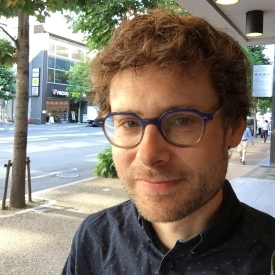![]() We are thrilled to be presenting a paper at DiGRA this summer. In brief, we argue for network analysis as an increasingly important method to study games for social learning. You can read our paper pre-print, or see the abstract below. We’re scheduled for Tuesday, August 27th at 2:30pm.
We are thrilled to be presenting a paper at DiGRA this summer. In brief, we argue for network analysis as an increasingly important method to study games for social learning. You can read our paper pre-print, or see the abstract below. We’re scheduled for Tuesday, August 27th at 2:30pm.
A Reality Game to Cross Disciplines? Building Human Capital, Passion and Offline Networks with Reality Ends Here. By Benjamin Stokes, Jeff Watson, Tracy Fullerton and Simon Wiscombe.
ABSTRACT: Educational and civic games are typically preparatory, teaching skills and information to be applied later. Yet the rise of reality gaming introduces a new possibility: that the game directly shapes real-world networks, even as it educates. Social capital and network effects — despite their complexity — are crucial in educational attainment, knowledge transfer, and civic participation. However, there is little research on how games can actively intervene to build lasting networks and social capital as a core component of gameplay.
Using methods of network analysis, this paper investigates the “Reality Ends Here” game over two years at a University in the United States. Reality Ends Here is played by incoming freshmen for 120 days in the fall semester of each school year. Students are drawn into the game via collectible cards, rumors, secret websites, and a mysterious black flag. The goal of the game is to increase and diversify student collaboration across disciplines, build social capital, and foster networking skills. The game is deliberately kept underground and unofficial, a rare design requirement in formal education.
The contribution of this paper is to demonstrate a framework for designing learning interventions around network effects, and measuring them with network analysis. Currently, network analysis is typically applied only to test game prototypes before scaling to wider distribution, or as heat maps for usability testing, or to measure game impact. We argue that network analysis may offer more value in a formative mode, providing what game designers refer to as “state information,” and integrating into the real-time practices of teachers. For example, we demonstrate how a player’s network centrality is correlated to their score in the game, and thus how well game performance is tied to network strength.
The game itself is part of a broader educational reform agenda for college freshmen. By connecting students to one another in ways that are both serendipitous and structured to maximize meaningful play and performance, the game seeks to help transform heavily siloed academic divisions into a productively chaotic and interdisciplinary community of practice. We analyze how disciplinary networks (i.e., academic majors) manifest in the game, and how overcoming them can be predictive of success in the game.
This paper analyzes how peer-to-peer learning and community-building can be structured as a real-world game, rewarding the development of the kinds of practices that are useful for collective organizing and meaningful participation. Additionally, this paper will help build theory for a more formative use of network analysis in game deployments. The immediate context is higher education, but the lessons are applicable to informal learning and civic education. Experiential learning is fundamental to building educational and civic habits; with this paper, the field will have a better basis for applying network analysis to optimize real-world games that build networks and social capital.
